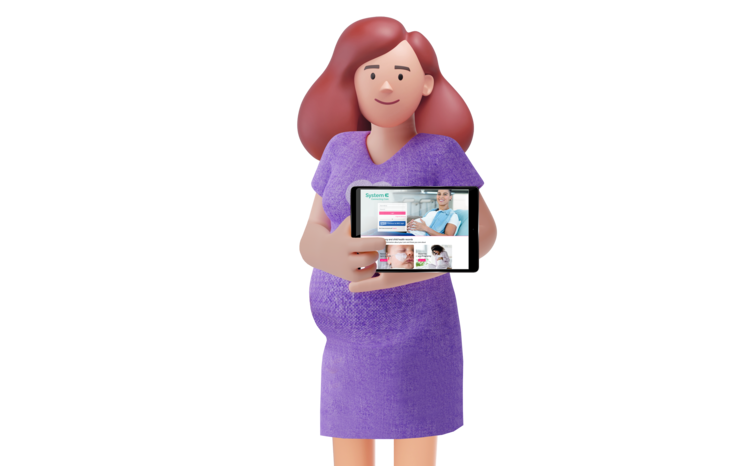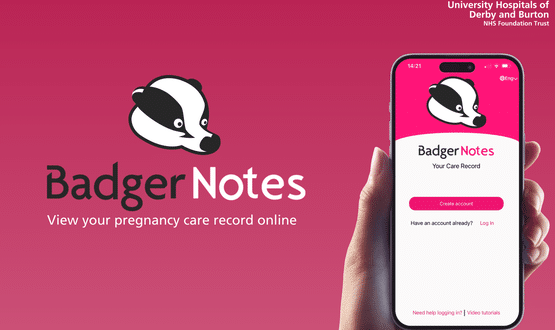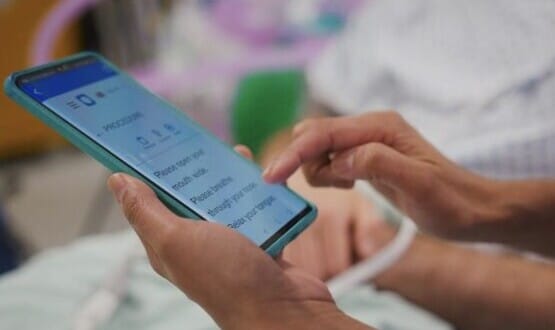Video consultations to apps – how digital tools can transform maternity care
- 4 August 2020

As the country was sent into lockdown technology played a huge role in helping people stay connected with their health and care, and maternity care was no different. Senior reporter Andrea Downey takes a look at how digital tools can keep expectant parents in touch with their midwife.
When it comes to maternity care it’s often seen in the more traditional sense, being very hands on and requiring face-to-face appointments.
But while check-ups with a midwife will never be entirely replaced, technology has an important role to play in keeping pregnant women connected with their midwife.
Never was this more evident than during the Covid-19 pandemic when the country was forced into lockdown and our reliance on health tech suddenly became more crucial.
Dr Lucy Mackillop, chief medical officer at Sensyne Health, explains that the acceleration of digital offerings in maternity care was about more than just transferring face-to-face appointment to video. A greater focus was placed on apps and remote monitoring technology.
It’s been wonderful to see maternity services across the country respond while still maintaining high standards of care,” she tells Digital Health News.
“I would urge maternity services to take advantage of what is on offer to deliver the best care, which will be critical in improving patient outcomes long after the current pandemic has passed.
“From simple innovations like video consultations or housing patient information on dedicated apps to remind women of when their next appointment is or sharing test information, to apps that help women monitor their pregnancy and give advice as to when a woman should contact her midwife – these tools will be part of how we will fundamentally change and improve our maternity service offering post-coronavirus.”
Putting care back into the hands of patients
Digital services help put care back in the hands of patients, allowing them to maintain their care without having to attend multiple appointments while balancing work and other responsibilities.
The could also save the health service money, according to Dr Mackillop. A National Institute for Health and Care Excellence (NICE) evaluation of GDm-Health, an app developed by Dr Mackillop and colleagues at University of Oxford and Oxford University Hospitals NHS Foundation Trust that allows pregnant women with diabetes to manage their care remotely, found it could save the NHS £230 per patient.
According to Dr Mackillop, a consultant obstetric physician at the trust, we’re at the “tip of the iceberg” of what digital services can achieve in maternity care.
“I am excited by the amount of research underway in this field that really puts women’s health needs at the heart of it,” she tells Digital Health News.
“In the future, I think we will see our understanding of pregnancy and the needs of pregnant women boosted by analysis of patient data using AI – there is an enormous amount of potential here for us to better diagnose and better treat complex conditions, to the benefit of women, their babies and the maternity healthcare system.
“Large datasets mean you can look at how different factors affect subpopulations of patients, so if women have an underlying condition it can explore what does and doesn’t work in terms of treatment.”
But these tools should only ever be used as a supplement to maternity care.
“Nothing can replace a physical examination when it is needed, especially for diagnosing and spotting complications,” Dr Mackillop explains.
“Digital services can’t replace that, but what they can do is complement in-person care, alleviating pressure on healthcare professionals and avoiding pregnant women having to come into hospital unnecessarily for things that can be addressed remotely with a higher degree responsiveness.
“Digital services should not and will not, I believe, replace direct clinical care but they can greatly augment that care.”
Not a permanent replacement
Kate Marsh, midwifery manager at charity Tommy’s, also cautioned that digital services should not replace face-to-face appointments.
“In maternity care those antenatal appointments are still very important, you have to be checking their bloody pressure and measuring their bump,” she tells Digital Health.
“The way our healthcare system is set up means you don’t tend to do appointments that aren’t essential anyway.
“As a midwife you always want to be around if someone wants to talk about their emotional wellbeing. And that could be done over the phone if you’ve built that relationship already with that client then it might be that, actually, just telephone contact is sufficient.”
During the pandemic Tommy’s brought forward the release of its Tommy’s Midwife voice skills, allowing expectant parents to receive verified answers when asking questions through Amazon Alexa and Google Assistant.
Putting patients at ease
As with any digital services, there’s a degree of apprehension from patients, perhaps heightened by the challenges of pregnancy and the need for intimate care.
Dr Mackillop says the “golden rule” is for patients to see digital services as an addition to their appointments and screenings.
“If someone has a concern or feels like something isn’t right in a pregnancy, the advice remains the same; consult your maternity team immediately and get it checked,” she says.
“Naturally, there are many challenges that come up with regard to digital services, whether related to maternity care or any other aspect of medicine, including fluency with technology and language barriers.
“It’s important that those in the health sector work with patients to overcome those obstacles.”




